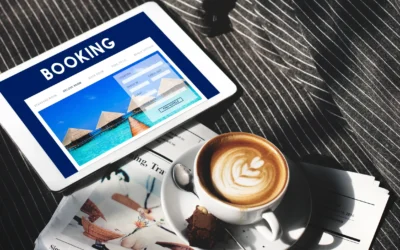Digital Marketing for Travel Agencies: 11 Proven Strategies to Boost Bookings
In 2024–2025, the travel industry is more digital than ever. For example, 80% of global travelers say it’s important to be able to book their entire trip online, and 86% of Millennials and 83% of Gen Zers especially lead this trend. Search engines, review sites, and social media are now frequent entry points for trip planning.
This shift means travel agencies can no longer rely purely on traditional advertising; to stay competitive, you need a strong digital presence. From capturing customers who aren’t yet aware of your destination to converting them when they’re ready to book, digital marketing bridges the gap.
In this article, you will see what “Digital Marketing for Travel Agencies” really means, why it’s essential (backed by data), and 11 proven strategies that help increase bookings, build trust, and grow revenue.
Table of Contents
What Is Digital Marketing for Travel Agencies?
Defining Digital Marketing in the Travel Industry
Digital marketing for travel agencies covers all online strategies used to promote travel services, packages, destinations, and experiences. This typically includes:
- Search Engine Optimization (SEO): Making sure your website appears when travelers search for things like “beach holidays”, “city escapes”, or “adventure tours”.
- Paid Advertising (PPC, Display, Social Ads): Running targeted ads on Google and social platforms to reach people based on interests, location, intent.
- Content Marketing: Travel blogs, destination guides, video tours, itinerary suggestions — all built to inspire and inform potential travelers.
- Social Media Marketing & Influencers: Visual content, reels, stories, posts from influencers, user-generated content to build awareness and trust.
- Email Marketing & Retargeting: Personalized emails, newsletters, abandoned-cart/past-visitor follow-ups to draw people back in.
How It Differs from Traditional Travel Advertising
| Traditional Travel Advertising | Digital Travel Marketing |
|---|---|
| Broad, high-cost methods (print, TV, flyers) | Targeted campaigns (search, social, email) |
| Hard to measure or attribute ROI clearly | Real-time metrics: clicks, conversion, engagement |
| Mostly passive exposure | Active engagement; conversation & feedback loops |
| One-size-fits-all messaging | Highly personalized: based on region, interest, behavior |
Data backs this up: ~72% of travelers in recent years prefer to book their trips online, using sites and apps where they can research and compare options. TravelPerk+1 Also, online bookings are expected to account for ~73% of revenue in the travel & tourism sector by 2026. TrustYou+2TravelPerk+2
Key Benefits of Digital Marketing for Travel Agencies
Digital marketing isn’t just “nice to have” in travel—it’s a core driver of growth, visibility, trust, and revenue. For travel agencies, getting digital right means not just being found, but being chosen. Below are major benefits, illustrated with data to show how real these advantages are.
1. Increased Online Visibility & Market Share
- In 2023, about 72% of travelers preferred online booking channels, while only 12% used traditional agencies. Navan
- The global online travel market was valued at US$512.5 billion in 2023, and is expected to more than double by 2030 (projected to reach ~US$1.26 trillion), growing at ~10.6% CAGR. Navan
These numbers show two things: (a) customers expect to research and book online, and (b) the market is growing rapidly. A travel agency with weak or no digital presence risks being invisible to the majority of potential travelers.
2. Cost-Efficiency & Measurable Return on Investment (ROI)
- Compared to traditional channels (print, outdoor ads, expensive direct mail), digital marketing allows precise targeting. High visibility is achieved with much lower waste.
- Performance metrics (click-through rates, conversion, cost per acquisition) are available in real time, enabling agencies to adjust or stop underperforming campaigns.
- As an example, using AI-driven segmentation and targeted campaigns has been shown to increase bookings by ~25% in some travel companies.
This means you can test, learn, and optimize continuously—spending smarter, not just more.
3. Building Customer Trust and Authority
- Travelers value reviews, testimonials, photos, and content that shows authentic experiences. A strong online presence with social proof can dramatically influence booking decisions.
- For instance, 74% of people now prefer to make all their trip bookings and reservations online, and many base their choice of destination on what they see on social media.
- With content marketing (blogs, guides, video) and expert SEO (GEO), agencies can position themselves as authorities. When people trust you, they’re more likely to book, refer, or buy add-on services.
4. Better Customer Targeting, Personalization & Retention
- Digital tools let you segment by travel intent, budget, demographics, location, interests. For example, you can target families, luxury travelers, adventure-seekers, or eco-tourists separately.
- AI-powered personalization (suggesting itineraries, recommending add-ons) increases conversion rates and customer satisfaction.
- Email marketing & retargeting allow you to nurture leads who didn’t purchase immediately, turning “looking” into “booking”.
5. Data-Driven Decision Making & Scalability
- Every campaign gives you data: which ads convert best, which blog posts draw traffic, what kind of itineraries people prefer. These insights let you refine offerings, drop what doesn’t work, and double down on what does.
- Tools like Google Analytics, social media insights, and marketing-automation dashboards empower agencies to forecast demand, adjust seasonality, and scale up successful campaigns rather than blindly increasing spend.
8. Email Marketing: Personalized Travel Offers
Email marketing may sound old-school, but it’s still one of the most effective tools for travel agencies. The key is personalization.
- Send segmented emails: families, luxury travelers, honeymooners.
- Share seasonal offers (e.g., winter ski packages, summer beach holidays).
- Automate follow-ups for abandoned cart bookings.
Stat: Email marketing has an average ROI of $36 for every $1 spent across industries, and in travel, personalized campaigns can perform even better. (litmus.com)
Pro tip: Pair email with retargeting ads. If someone browsed “tours in Italy” on your site, they should get a follow-up email and see ads reminding them to book.
9. Reputation Management: Reviews & Testimonials
Travel is built on trust. A glowing review can convince someone to book; a negative one can push them away.
- Encourage happy customers to leave reviews on Google, TripAdvisor, or Yelp.
- Feature testimonials and case studies on your website.
- Respond promptly (and professionally) to negative reviews to show accountability.
Stat: 95% of travelers read reviews before booking, and 83% say reviews make them more confident about their decisions. (trustpilot.com)
A strong online reputation doesn’t just drive bookings—it builds long-term credibility.
10. Website Optimization: From Browsers to Bookings
Your website is your digital storefront. If it looks outdated, loads slowly, or makes booking complicated, travelers will leave.
Best practices:
- Ensure mobile-first design (most bookings come from smartphones).
- Use clear CTAs like “Plan My Trip” or “Book Now.”
- Simplify booking forms—fewer steps, fewer drop-offs.
- Highlight trust signals: secure payment badges, reviews, and testimonials.
Stat: A 1-second delay in website load time can reduce conversions by 7%. (neilpatel.com)
In travel, that can mean thousands of dollars lost each month.
11. Data Analytics: Tracking What Works
Digital marketing’s biggest strength? Everything is measurable.
- Use Google Analytics to track where bookings come from.
- Monitor ad spend ROI (PPC, Meta Ads).
- Use CRM tools to follow customer journeys from first click to final booking.
Data-driven insights allow agencies to:
- Identify best-performing campaigns.
- Adjust budget to maximize ROI.
- Forecast demand based on seasonality.
Example: If analytics shows Instagram drives more bookings than Facebook, you double down on Instagram campaigns instead of guessing.
Common Mistakes Travel Agencies Make in Digital Marketing
Even with the best intentions, many travel agencies fall into common traps that waste money, reduce visibility, and cost bookings. Knowing what not to do is just as important as knowing what works. Here are the biggest mistakes we see agencies make—and how to avoid them.
1. Ignoring Mobile Optimization
With more than 60% of travel searches and bookings happening on mobile devices (thinkwithgoogle.com), a site that isn’t mobile-friendly is a deal-breaker.
- Mistake: Travel agencies still use desktop-heavy designs that load slowly on smartphones.
- Fix: Invest in responsive design, fast-loading images, and mobile-first booking forms.
2. Over-Reliance on Word-of-Mouth or Offline Marketing
While referrals and traditional ads still play a role, relying on them alone is risky.
- Mistake: Assuming loyal customers will spread the word without digital support.
- Fix: Use digital tools—email, social media, and SEO—to amplify word-of-mouth and reach broader audiences.
3. Poor Tracking and Data Use
Digital marketing’s superpower is measurability—but many agencies don’t take advantage.
- Mistake: Running ads or content campaigns without tracking ROI.
- Fix: Use analytics dashboards to measure leads, cost per booking, and channel performance. This ensures you spend smarter, not harder.
4. Generic Messaging That Fails to Differentiate
The travel industry is crowded. If your message sounds like everyone else’s—“We offer the best vacations”—you’ll blend into the noise.
- Mistake: Copy-paste promotions without showcasing your unique value (e.g., niche expertise, personalized itineraries, special access).
- Fix: Craft value-driven messaging that highlights what sets you apart (luxury expertise, eco-tourism focus, family-friendly customization, etc.).
5. Neglecting Online Reviews & Reputation Management
Travel decisions are trust-based. A single negative review left unanswered can deter dozens of potential customers.
- Mistake: Not responding to reviews or only highlighting positive ones.
- Fix: Acknowledge negative feedback, resolve issues, and showcase testimonials across channels. This builds transparency and credibility.
6. Spreading Too Thin Across Platforms
Some agencies try to be everywhere—Facebook, Instagram, TikTok, LinkedIn, YouTube—without enough resources to do each well.
- Mistake: Posting inconsistently and without strategy.
- Fix: Focus on the 1–2 platforms where your audience actually spends time, and deliver consistent, high-quality content there.
7. Not Investing in Professional Help
Digital marketing can seem simple on the surface, but DIY approaches often fall short.
- Mistake: Running campaigns without expertise, leading to wasted ad spend and low ROI.
- Fix: Partner with a specialized travel marketing agency that understands your audience, platforms, and best practices. This saves time and ensures better results.
How Our Agency Helps Travel Businesses Grow Online
Our agency doesn’t just follow current best practices — we stay ahead. One of the most powerful emerging trends is GEO (Generative Engine Optimization), which ensures your content is not only found by people via Google and social media, but also by AI tools like ChatGPT, Gemini, AI Overviews, Perplexity, etc.
Here’s how we help travel businesses grow online — with both SEO and GEO baked in.
Tailored SEO + GEO Campaigns for Travel Agencies
- We start with keyword research and conversational query research. Not just “luxury safari”, but “What’s the best safari for families with kids?” or “Hidden safari lodges in Botswana that don’t cost a fortune”. GEO specifically emphasizes matching how users ask questions in natural language.
- We optimize technical elements (site speed, mobile responsiveness, structured data / schema markup) so AI-engines can accurately crawl, process, and surface your content. That improves chances of being cited in AI Summaries, not just ranking high in traditional search.
- We structure content modularly — using headings, FAQs, lists, pull-quotes — so parts of your content can be extracted by AI tools as standalone answers. GEO benefits from content that is clear, split into smaller “information units”, and independently useful.
Social Media, Content & Multimedia with GEO in Mind
- We ensure content isn’t only visually engaging but also supports AI platforms. For example, alt-texts on images, transcripts or summaries for video content, and metadata that clearly explains what each piece is about. AI models often use these to understand and cite content.
- We craft content that answers travel planning questions directly: itineraries, “best of” guides, suggestions for specific traveler types, etc. These formats work well with AI because they align with how such tools are asked questions.
Paid Ads, Conversion, and GEO-Driven Visibility
- While paid ads don’t directly influence AI-engine answers, paid campaigns help in brand awareness, which contributes to AI trust signals (e.g. how often your brand appears in different contexts, how authoritative it seems).
- We combine GEO with SEO to maximize chances your site gets picked up in Featured Snippets, Google’s “answer boxes”, and AI summary cards (which often draw from high-ranking, well structured content).
Data-Driven Strategy & GEO Monitoring
- We track traditional SEO metrics like keyword rankings and traffic, and emerging GEO-related signals such as whether your content is cited in AI Overviews, how often your FAQ content surfaces in conversational queries, and how AI-friendly structured content performs in user engagement.
- We audit content for “AI readability” — clarity, structure, uniqueness, presence of reliable sources — because AI models favor credible, authoritative content. GEO rewards not just what you say, but how you say it.
Why Our Approach to GEO Adds Value
- Our agency doesn’t treat GEO as a trend, but as essential: ensuring your destination, tour packages, and content are visible inside the future of search.
- We help you build content that gets picked up not only in Google, but by AI travel assistants and chatbots — potentially influencing customer decisions even before they land on your website.
- Our GEO-aware approach means: better discoverability, better trust (because detailed, authoritative content wins), and more conversions from people who start their travel planning with AI tools.
Conclusion: Why Now Is the Time to Invest in Digital Marketing
The travel industry is evolving rapidly, shaped by digital-first habits and AI-powered search tools. Travelers today discover destinations on Instagram, compare packages on Google, and trust reviews and recommendations they find online. To stay competitive, travel agencies must meet travelers where they are—in the digital space.
From SEO and paid ads to social media and influencer campaigns, the strategies we’ve outlined aren’t just marketing trends—they’re essential building blocks for growth. Add to that the rise of Generative Engine Optimization (GEO), and it’s clear that the future belongs to agencies that create AI-friendly, customer-first content that earns visibility across both search engines and conversational AI platforms.
The benefits are clear:
- More visibility in a crowded market
- Smarter ad spend with measurable ROI
- Stronger trust and credibility with travelers
- Sustainable, scalable growth
The biggest risk isn’t investing in digital marketing—it’s falling behind competitors who already are.
Take the Next Step
If you’re ready to:
✅ Attract more travelers
✅ Boost bookings with proven strategies
✅ Future-proof your business with SEO and GEO
…then the next step is simple: start implementing a tailored digital marketing strategy today.
Whether you begin with SEO, paid ads, or content marketing, consistency is what transforms visibility into revenue. And if you want faster, smarter results, partnering with professionals who specialize in travel marketing will save you time, reduce wasted spend, and deliver growth you can measure.
The travel industry isn’t waiting—neither should you.
Email us at contact@travelseo.agency
FAQs About Digital Marketing for Travel Agencies
1. What is digital marketing for travel agencies?
Digital marketing for travel agencies refers to online strategies such as SEO, paid ads, content marketing, social media, email campaigns, and GEO (Generative Engine Optimization). These tools help agencies increase visibility, attract more clients, and drive bookings in a competitive marketplace.
2. Why is SEO important for travel agencies?
SEO ensures that when travelers search for terms like “family vacations in Greece” or “luxury tours in Japan,” the agency’s website appears. Since 68% of travel planning starts with a search engine, ranking high directly translates into more leads and bookings.
3. What is GEO, and how does it help travel agencies?
GEO (Generative Engine Optimization) is the practice of optimizing content for AI-driven tools like ChatGPT, Google AI Overviews, and Perplexity. Unlike traditional SEO, GEO focuses on clarity, structure, and credibility so that AI tools cite or recommend a brand in conversational answers. For travel agencies, this means being surfaced in AI-generated trip planning suggestions and search summaries.
4. How much should a travel agency spend on digital marketing?
Budgets vary, but benchmarks suggest 5–10% of revenue should go toward marketing. Agencies aiming for fast growth or expansion into new markets may allocate more (up to 15%). The advantage of digital channels is flexibility: you can start small, measure ROI, and scale up as results grow.
5. Which social media platforms work best for travel agencies?
The right platforms depend on the target audience:
- Instagram & Pinterest: great for luxury and visual inspiration.
- TikTok & YouTube: ideal for Gen Z and adventure-seekers.
- Facebook: strong for family travel and community engagement.
- LinkedIn: useful for B2B partnerships (e.g., with hotels, airlines, event organizers).
6. How long does it take to see results from digital marketing?
- SEO: 4–6 months for significant impact, with results compounding over time.
- Paid Ads: Immediate visibility, with bookings possible in days.
- Content & Social Media: Typically 2–3 months for consistent engagement and lead flow.
- GEO: Early adopters are starting to see results, but consistent inclusion in AI-driven results may take several months.
7. Can travel agencies handle digital marketing themselves?
It’s possible to manage digital marketing in-house, but it often requires significant time, expertise, and access to tools. Without experience, many agencies struggle with wasted ad spend, poor targeting, or weak SEO strategies. Partnering with specialists usually delivers faster, more consistent results and allows the agency to focus on serving clients.




